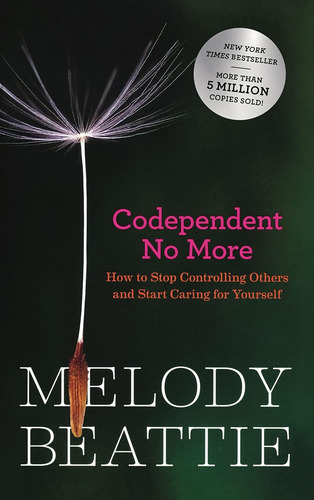Libro Codependent No More How To Stop Controlling Others
en 24 meses de
Conoce los tiempos y las formas de envío.
Disponible 17 días después de tu compra
+5mil
Vendido por GREVILLEA
+10mil Productos
+5mil
Ventas concretadas
No brinda buena atención
Entrega sus productos con demora
Medios de pago
Meses sin Tarjeta
Tarjetas de crédito
¡Paga en hasta 3 cuotas!
Tarjetas de débito
Efectivo

Características del producto
Características principales
Título del libro | Codependent No More: How to Stop Controlling Others and Start Caring for Yourself |
|---|---|
Autor | MELODY BEATTIE |
Idioma | Español |
Editorial del libro | Spiegel & Grau |
Tapa del libro | Blanda |
Año de publicación | 2022 |
Otros
Cantidad de páginas | 288 |
|---|---|
Altura | 1 cm |
Ancho | 1 cm |
Peso | 1 g |
Con páginas para colorear | No |
Con realidad aumentada | No |
Género del libro | Filosofía y psicología |
Tipo de narración | Manual |
Edad mínima recomendada | 12 años |
Cantidad de libros por set | 1 |
ISBN | 9781954118157 |
Descripción
Codependent No More: How to Stop Controlling Others and Start Caring for Yourself
Melody Beattie's compassionate and insightful look into codependency--the concept of losing oneself in the name of helping another--has helped millions of readers understand that they are powerless to change anyone but themselves and that caring for the self is where healing begins.
Is someone else's problem your problem? If, like so many others, you've lost sight of your own life in the drama of tending to a loved one's self-destructive behavior, you may be codependent--and you may find yourself in this book. With instructive life stories, personal reflections, exercises, and self-tests, Codependent No More helps you to break old patterns, maintain healthy boundaries, and say no to unhealthy relationships. It offers a clear and achievable path to freedom and a lifetime of healing, hope, and happiness.
This groundbreaking book is even more relevant today, as readers confront new, urgent challenges with greater self-awareness, than it was when it first entered the national conversation over thirty-five years ago.
